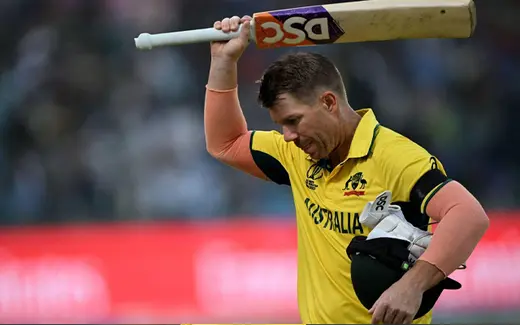
Australian cricketer David Warner is expected to skip the white-ball leg of the West Indies tour of Australia in February, sparking speculations about his focus on T20 leagues post an imminent Test retirement in Sydney. The decision aligns with Warner’s commitment to playing for the Dubai Capitals in the Indian League T20 (ILT20), scheduled from January 20 to February 18.
The West Indies tour comprises three ODIs and three T20Is from February 2 to 13. Australian Cricketers’ Association CEO, Greenberg, hints at Warner potentially applying for a No Objection Certificate to participate in the ILT20. Greenberg acknowledges Warner’s dedication to the Big Bash League (BBL) and emphasizes the need for schedule flexibility, encouraging players to pursue opportunities with the best return on investment.
‘I think the short answer to that is probably yes.’
“There’s no doubt in the next phase of Dave’s life he’s going to be looking to ply his trade where he gets the best return on his investment. I don’t think there’s anything wrong with that, in fact I’m encouraging him to do that. There will be times where he’ll be looking to miss certain games and tours. That’s the sort of flexibility we’ve got to get our heads around. Some people won’t like that, but that’s the modern world of which we’re living in and we have to embrace it,”
Warner’s preference for domestic T20 deals over international duties may signify a significant shift in Australian cricket dynamics. While selectors anticipate the absence of senior players in the West Indies series, they aim for a full-strength squad in the T20Is in New Zealand, crucial preparation for the upcoming T20 World Cup in the Caribbean and USA.
The ODIs against West Indies mark the commencement of a new four-year cycle toward the 2027 World Cup. Despite Warner expressing interest in participating in the 2027 World Cup after Australia’s triumph in India, he recently announced that he won’t accept a Cricket Australia central contract next year. This decision is influenced by constraints associated with contractual obligations and sponsorships.
Warner had expresses concerns about the contractual system becoming cumbersome at this stage of his career. His decision to skip the contract is based on avoiding long-term costs associated with low contracts, highlighting the need to think about contractual agreements moving forward.
“I won’t be taking a contract, definitely not,” Warner had said. “How the system works in Australia is that if you play five [T20] games or ODIs, or three Tests, you get upgraded and then you’re legally bound by contracting system with sponsors and stuff.
“That’s something that becomes a bit of a pain in the backside, especially at my stage of my career. So I don’t want to be signed to that agreement and that’s something I have to think about moving forward because if you’re going to get a low contract, it’s going to cost you a lot in the long run with sponsorships,” he added.
This move aligns with Warner’s desire for flexibility and independence in sponsorship choices, reflecting considerations at his career stage and potentially impacting player-contract dynamics in Australian cricket. The cricket community watches closely, considering Warner’s choices as a potential precedent for other players navigating contracts and international commitments in the modern cricket landscape.
Also, see:
Big blow to Mumbai Indians ahead of IPL 2024
